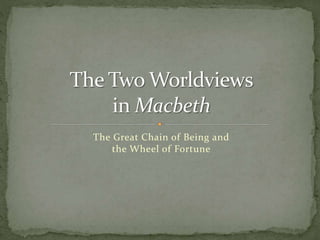The Two Worldviews of Macbeth
- 1. The Great Chain of Being and the Wheel of Fortune
- 3. ’éŚ The ŌĆ£ChainŌĆØ is an ancient idea, but popular in medieval Christianity. ’éŚ It supports the notion that there is a ŌĆ£hierarchyŌĆØ, or natural inequality, in GodŌĆÖs universe. ’éŚ In ShakespeareŌĆÖs time, it was still popularly believed that people had to ŌĆ£know their placeŌĆØ. ’éŚ Moving above your ŌĆ£stationŌĆØ, or marrying below your social status, was an insult to God.
- 4. ’éŚHecate says this about Macbeth: ’éŚ ŌĆ£He shall spurn fate, scorn death and bear/ His hopes ŌĆśbove wisdom, grace and fear.ŌĆØ 3.5.30-31
- 7. ’éŚ A competing ontological notion was the Wheel of Fortune. ’éŚ It was cyclical rather than linear. ’éŚ The ŌĆ£WheelŌĆØ was a relatively pagan concept, popular in ancient Greece and Rome. ’éŚ The goddess Fortunae (or Fate) was fickle and unreliable; good fortune would rarely last. What went up had to come down! ’éŚ J.D. Duffy: ŌĆ£Once on the wheel, no one gets off until the descent has been madeŌĆ”ŌĆØ
- 9. ’éŚ Scholars have linked the two concepts in the following way: ’éŚ Those who ignored the Chain of Being, such as Macbeth and his wife, were throwing themselves onto the Wheel of Fortune. ’éŚ J.D. Duffy: ŌĆ£A wise man would follow GodŌĆÖs law, and not surrender himself to fortuneŌĆØ. ’éŚ This moral choice helps explain MacbethŌĆÖs tragic nature: heŌĆÖs a noble man whose ŌĆ£tragic flawŌĆØ (A.C. Bradley) is ambition.
- 10. ’éŚ If Macbeth has chosen to forsake his place on the Chain of Being in favour of the Wheel, is this an act of free will? ’éŚ Look to the emissaries of fate and fortune, like the Weird Sisters. Are they determining MacbethŌĆÖs path? Are they messengers or agents? Or is Macbeth choosing his own path? ’éŚ ŌĆ£Men at some time are masters of their fates; The fault, dear Brutus, is not in our stars, But in ourselves, that we are underlings.ŌĆØ (Julius Caesar: I.I.139-141)
- 11. ’éŚ Duffy, J.D. ŌĆ£Introduction to Macbeth." The Tragedy of Macbeth. New York: Airmont, 1965. xix-xxix. Print. ’éŚ Bradley, A. C. Shakespearean Tragedy. Greenwich, Conn.: Fawcett, 1904. Print.










